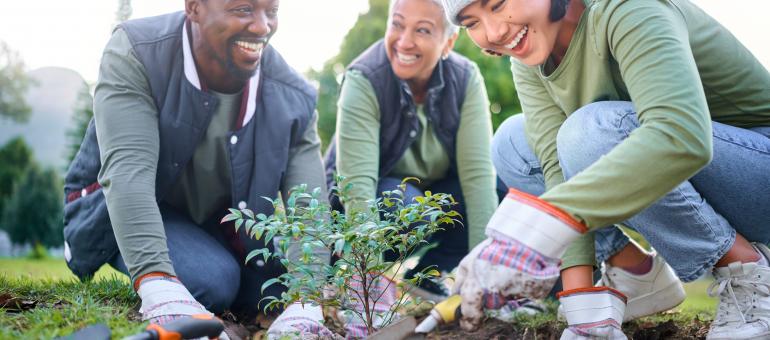Celebrating Earth Day: Q&A with Teresa Ortigosa, Global Sustainability Director

Every year, on April 22, people around the world come together to celebrate Earth Day — a collective dedication to raising awareness about environmental issues and promoting sustainable living. It began in 1970, a rare bipartisan effort that led to the establishment of the Environmental Protection Agency and groundbreaking environmental laws.
But Earth Day isn't just about one day of action. It’s a reminder that we all have a role to play in protecting our planet every single day. From making small changes in our daily lives to advocating for systemic change, there are countless ways we can make a difference.
To get a better understanding of Earth Day, we posed a few questions to Teresa Ortigosa, Global Sustainability Director at Veolia Water Technologies & Solutions.
Why is it important to shed light on the environmental challenges our globe is facing today and every day?
Unfortunately it is starting to be too late to reverse some of the environmental damages that our planet is suffering. As humans we have failed to take care of our planet and its natural resources and biodiversity.
For instance, most people have already seen the consequences of climate change at their doorstep. This, linked to a greater access to “the right” information in the last decades, has helped to shed light on the environmental challenges.
So it is more relevant than ever to continue communicating and educating on environmental challenges to help mitigate further damage and transform some of the activities damaging the environment. By doing so, we can collectively work toward regenerating our planet and its natural resources.
At Veolia, our commitment to making meaningful change extends far beyond Earth Day. Every day, we strive to be a leader in environmental solutions, working tirelessly to protect our planet and its resources. From developing innovative technologies that reduce pollution and conserve water, to implementing sustainable practices across our operations, we are dedicated to creating an ecological transformation that makes us more resilient and sustainable. Our global team of experts collaborates with communities, businesses, and governments to tackle the most pressing environmental challenges, driving positive change through our actions and inspiring others to join us in our mission.
What are some of the most prominent issues, and how are they being addressed?
Depletion of resources, climate change, water scarcity, feeding the increasing global population, pollution, land erosion, and a loss of biodiversity are all interconnected environmental and social problems that are worsening. Some might say, “the house is on fire,” and we have to try and put it out.
Developing renewable energy projects around the world will help. Today, only 5.5% of global energy is produced by renewable resources. Commodity technologies like solar and wind energy can help us make progress.
Water reuse is crucial to addressing water scarcity. Mature technologies to achieve high rates of recovery and reuse have existed in the market for many years. More investments in renewable projects and water recovery and reuse are critical to regenerate the planet and fight the Climate crisis.
Countries have bought into making a difference through efforts like the United Nations’ Sustainable Development Goals, but we need buy-in from companies as well so we can make a true ecological transformation. While for instance as a society we’ve made progress with air pollution, we need the public and private sector to help increase the availability of safe, clean water for more people around the world — nearly 30% of the world doesn’t have access to it.
What technologies and solutions is Veolia currently prioritizing to promote ecological transformation and a sustainable water future for all?
Veolia is a global leader in environmental solutions and has been actively working toward promoting an ecological transformation and sustainable water future.
Our experts have been at the forefront of innovative technologies for water treatment like ZeeLung* membrane aerated bioreactors (MABRs) and ZeeWeed* membrane bioreactors (MBRs). We’ve developed solutions for the circular economy like Memgas*, which enables the recovery of energy from wastewater through the production of biogas, and digital management solutions like the Hubgrade* platform, which provides real-time monitoring, data analysis, and optimization of water systems. We’re working hard to develop the next generation of water solutions that will make a global impact.
How critical is the role of water treatment technologies in the overall global decarbonization effort?
Water treatment technologies play a crucial role in addressing climate change in various ways. Conventional water treatment processes can be energy-intensive, contributing to greenhouse gas emissions from the use of fossil fuels. Advanced water treatment technologies like membrane filtration, advanced oxidation processes, and energy-efficient aeration systems can significantly reduce the energy consumption and associated carbon footprint of water treatment facilities. Optimizing water treatment processes and implementing energy recovery systems can further reduce the overall energy demand and emissions.
Water treatment technologies are essential for enabling water reuse and recycling, which can reduce the energy and emissions associated with sourcing, transporting, and treating fresh water supplies. Treated wastewater can be safely reused for various purposes, such as industrial processes, agricultural irrigation, and even potable water supply, reducing the demand for energy-intensive desalination or long-distance water transfers.
Water treatment technologies also play a vital role in supporting the production of renewable energy sources, such as hydropower, biofuels, and concentrated solar power (CSP). Proper water treatment is necessary to prevent fouling, scaling, and corrosion in these systems, ensuring their efficient and sustainable operation.
In addition, water treatment technologies are crucial for enabling carbon capture and storage (CCS) systems, which are considered essential for decarbonizing industries with high CO2 emissions, such as power generation and cement production. Water treatment is required for the preparation of solvents used in CO2 capture processes and for the management of wastewater streams generated during CCS operations.
Effective water treatment helps mitigate the impacts of climate change on water resources by removing pollutants, reducing water stress, and protecting aquatic ecosystems. Healthy water resources and ecosystems are essential for supporting sustainable agriculture, forestry, and other natural carbon sinks, which play a crucial role in mitigating climate change.
What are the latest innovations in water reuse, and what challenges do we face in implementing these technologies more broadly?
Water reuse is becoming an increasingly important strategy for addressing water scarcity and promoting sustainability. New technologies are becoming more efficient and cost-effective, enabling the treatment and reuse of various types of wastewater for different purposes.
However, there are several challenges in implementing water reuse technologies more broadly, like public acceptance and perception, regulatory barriers, infrastructure and investment costs.
Overcoming public concerns about the safety and quality of recycled water, particularly for potable reuse, is a significant challenge. Inconsistent or outdated regulations can hinder the adoption of new technologies, while implementing water reuse systems often requires significant infrastructure investments. Advanced treatment processes can be energy-intensive and require specialized operational expertise, increasing operational costs. Potential environmental impacts, such as the disposal of concentrated brine streams need to be carefully managed.
To address these challenges, a combination of technological advancements, public education and outreach, regulatory updates, financial incentives, and collaborative efforts among stakeholders is required. This includes governments, utilities, industries, and communities working together to promote the adoption of water reuse technologies and practices while ensuring the safety, sustainability, and economic viability of these solutions.
*Trademark of Veolia; may be registered in one or more countries.







